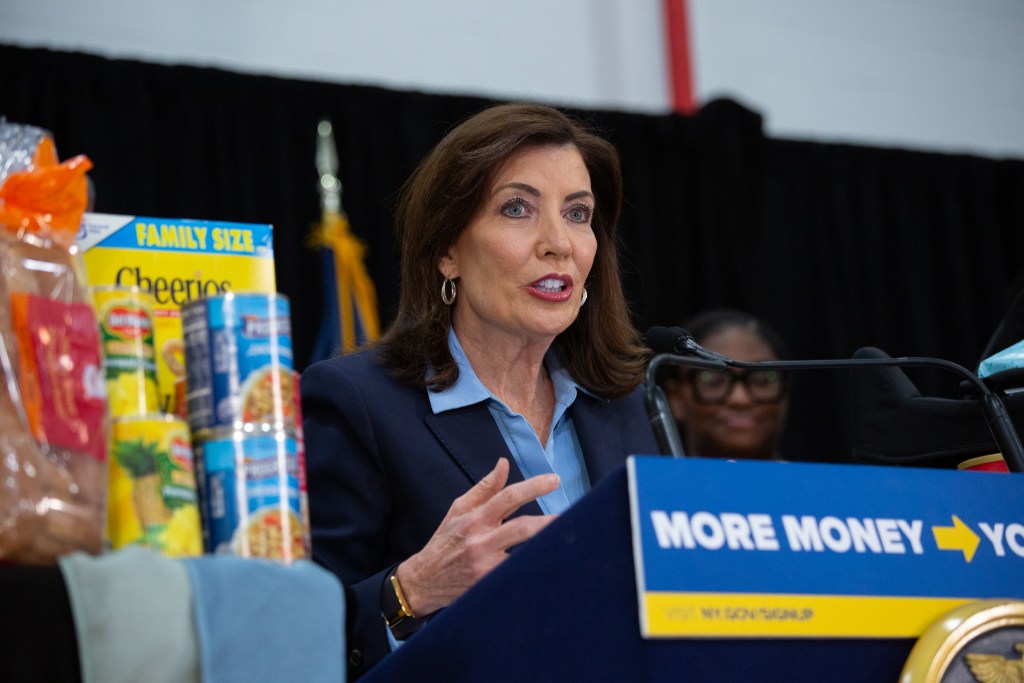Two weeks ago, Gov. Kathy Hochul announced a budget deal that would set state spending at $254 billion, up more than 5% from last year, and would include her key priorities of a school cellphone ban, changes to criminal discovery laws, flexibility for involuntary confinement of mentally ill people and funding for the MTA capital plan.
But with final passage on Friday of the budget for the fiscal year that began April 1, the governor and legislature also agreed on a bailout of the state’s unemployment insurance program, the first ever state housing aid vouchers, and enhanced business tax breaks that the governor supported but not the real estate incentives supported by the administration of Mayor Eric Adams.
Meanwhile the secretive process that produced the budget with no public debate has come in for scathing criticism.
“New York’s budget is more than five weeks late. Worse, it is full of decisions made in complete secrecy by the ruling Democratic party majority,” said the good-government group Reinvent Albany in a statement.
Bailing out the state’s unemployment insurance program is the biggest post-budget move and the one with the most ramifications. New York owed the federal government $6 billion for money it borrowed during the pandemic to pay benefits and was slowly paying it down through increased unemployment insurance taxes on employers.
That both burdened business and prevented the state from increasing the maximum weekly benefit from the current level of $504 a week.
Now the state will take $7 billion from its reserves to pay off the debt and stabilize the fund, and Democrats are expected to seek an increase in benefits before adjourning in June.
Doing so reduces the state’s reserves by a third to about $14 billion at a time when a recession could cut into tax revenues and Republicans are seeking to cut the $90 billion in federal aid included in the budget.
Hochul defended dipping into the reserves.
“I said we’d use them for a rainy day,” Hochul told reporters Tuesday. “Yes, it is raining.”
A new Lower East Side residential tower sits over tenement buildings, Nov. 20, 2023. Credit: Ben Fractenberg/THE CITY
Anti-poverty and real estate groups finally succeeded in a years-long effort to convince the governor to create to a statewide housing voucher program, though she agreed to allocate only $50 million for the first of the four years authorized in the legislation. Still, the program could become a tool to replace federal voucher money, which is threatened in President Donald Trump’s proposed budget.
In return, the legislature agreed to allow rental buildings built after 1996 containing at least 100 units to convert to condominiums as long as 15% of the tenants agree and that a certain percentage of units are set aside as affordable.
Co-op and condo conversions came to halt after passage of the 2019 rent law, which in addition to eliminating most pathways to removing rental apartments from regulation sharply raised to 50% the threshold of renters who needed to agree to a conversion. This change, long pushed by real estate groups like the Real Estate Board of New York, is the first major alteration in that law. It also helps satisfy demands from particularly Black legislators outside Manhattan for a way to help their constituents become homeowners.
Hochul won an extension of New York’s controversial $700-a-year million movie and TV production credit by two years through 2036, adding $100 million a year for independent productions, and raising the credit to 40% from 30% for companies producing at least three major projects in the state.
Production crews film an episode of “And Just Like That” in Greenwich Village, Oct. 28, 2024. Credit: Ben Fractenberg/THE CITY
A temporary pandemic-related theatrical production tax break instituted in 2020 is being increased by one-third to $400 million in total and extended through 2027.
But the legislature did not include an extension of the REAP program, which provides a $3,000 tax credit for 12 years for every employee a company moves to most areas north of 96th Street in Manhattan and the other boroughs, and which is strongly supported by REBNY and the Adams administration.
It also declined to approve a new proposed credit from the Adams administration called RACE, short for the Relocation Assistance Credit per Employee. RACE would authorize the city to provide a one-time $5,000 credit per full time worker for firms moving to New York and leasing at least 20,000 square feet in a building built before 2000 — an attempt to help fill office space drained during the pandemic.
Prospects still remain good for the legislature to approve those tax breaks before adjourning next month, REBNY said in a statement.
Given the rocky economy and threats to federal aid, the legislature gave the governor the power to cut the budget if revenues fall although the legislature could vote to reject or replace her reductions.
Our nonprofit newsroom relies on donations from readers to sustain our local reporting and keep it free for all New Yorkers. Donate to THE CITY today.
The post Business Boosts Mark Hochul’s ‘Rainy Day’ Spending Plan appeared first on THE CITY – NYC News.

